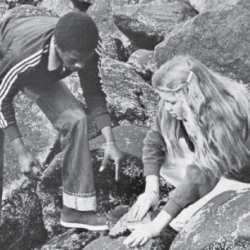Source Institutions
Source Institutions
Add to list Go to activity
Activity link broken? See if it's at the internet archive

In this outdoor activity/field trip, learners investigate organisms that live along the ocean's rocky coast. Learners add bare rocks to an intertidal zone, and over the course of 6-8 weeks observe what plant and animals colonize (come to live) on the new rocks. The intertidal zone, covered by water during high tides and uncovered at low tides, is usually densely covered with marine organisms such as seaweeds, mussels, barnacles, snails, limpets, anemones and sea stars. Learners may not only discover pioneer organisms (first colonizers) of their new rocks, but other organisms that replace the first arrivals in the process of succession. This activity calls for multiple, weekly return visits to the intertidal zone.
- Under 5 minutes
- 1 to 12 months
- $10 - $20 per group of students
- Ages 8 - adult
- Activity, Field Trip, Lesson/Lesson Plan
- English
Quick Guide
Materials List (per group of students)
- wide-tip, permanent-ink marking pens (bright color)
- large index cards
- pencils
- work gloves (optional)
- tide table
- data board
- "Use of the Tide Table" Technique Card (page 5 of PDF)
- twine (optional)
- intertidal guidebook (optional)
Subjects
-
Earth and Space Science
-
Earth Structure
- Rocks and Minerals
- Oceans and Water
-
Earth, Moon and Sun
- Tides
-
Earth Structure
-
Life Sciences
-
Diversity of Life
- Plants
- Animals
-
Ecology
- Ecosystems
- Populations
-
Human Senses and Perception
- Touch
- Smell
-
Diversity of Life
-
Mathematics
-
Data Analysis and Probability
- Data Collection
-
Data Analysis and Probability
-
The Nature of Science
-
The Scientific Process
- About Inquiry
- Asking Questions
- Conducting Investigations
- Gathering Data
-
The Scientific Process
Informal Categories
- Animals
- Nature and Environment
- Outdoor Activity
- Physical Activity
Audience
To use this activity, learners need to:
- see
- be mobile
- smell
- touch
Learning styles supported:
- Involves teamwork and communication skills
- Involves hands-on or lab activities
Other
This resource is part of:
Access Rights:
- Free access
By:
Rights:
- All rights reserved, The Regents of the University of California, 1981
